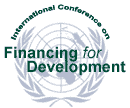
Department of Public Information - News and Media Services Division - New York
18-22 March 2002
20 March 2002
 |
International
Conference on Financing for Development Department of Public Information - News and Media Services Division - New York |
|
| Monterrey, NL, Mexico 18-22 March 2002 |
20 March 2002 |
|
|
|
|
Thoraya Ahmed Obaid said that today's paradoxical world was defined by the fact that the 10 richest nations individually were richer than the 10 poorest nations combined. That must be resolved. Today, women and men lived and suffered the consequences of poverty, malnutrition , chronic ill health, exposure to communicable diseases, and maternal mortally, and 40 million were living with HIV/AIDS. She said it was possible to end poverty, at least, extreme
poverty. "We all knew what needed to be done and, to a large extent,
how to do it." And the root causes were beginning to be understood.
For example, it was clear that economic poverty had social roots. Achieving
the desired goals would lay a foundation for eradicating poverty, but
resources were needed. She said that $17 billion was to have been mobilized in 2000 for population activities, but, so far, only $11 billion had been raised. And, while the developed countries had not reached 50 per cent of their share, the developing countries had attained 80 per cent from domestic resources to meet their commitments. Turning to official development assistance (ODA), she said the decline must be reversed, since failure to meet the agreed target would set back achievements and increase the gap between poor and rich. In Monterrey, leaders should pledge more support to women and free them from poor health and lack of education. "Investing in women is investing in change and in the future", she said. Asked how the gender issue fared in the context of the Monterrey consensus, Ms. Obaid said the outcome text had reflected the issue of women's rights in some three or four places, so there was some attention being given to those issues. It should also be remembered that the Millennium Summit goals, such as decreasing maternal mortality and preventing HIV/AIDS, including minimizing the effect on women, must be implemented. She added that, in some African countries, for every man who was infected with HIV/AIDS, six to eight girls were infected. In general, resources should be mobilized so that women, in real terms, were not excluded from the agenda, whether in terms of education, health or HIV/AIDS prevention.
Press Conferences Conference News |